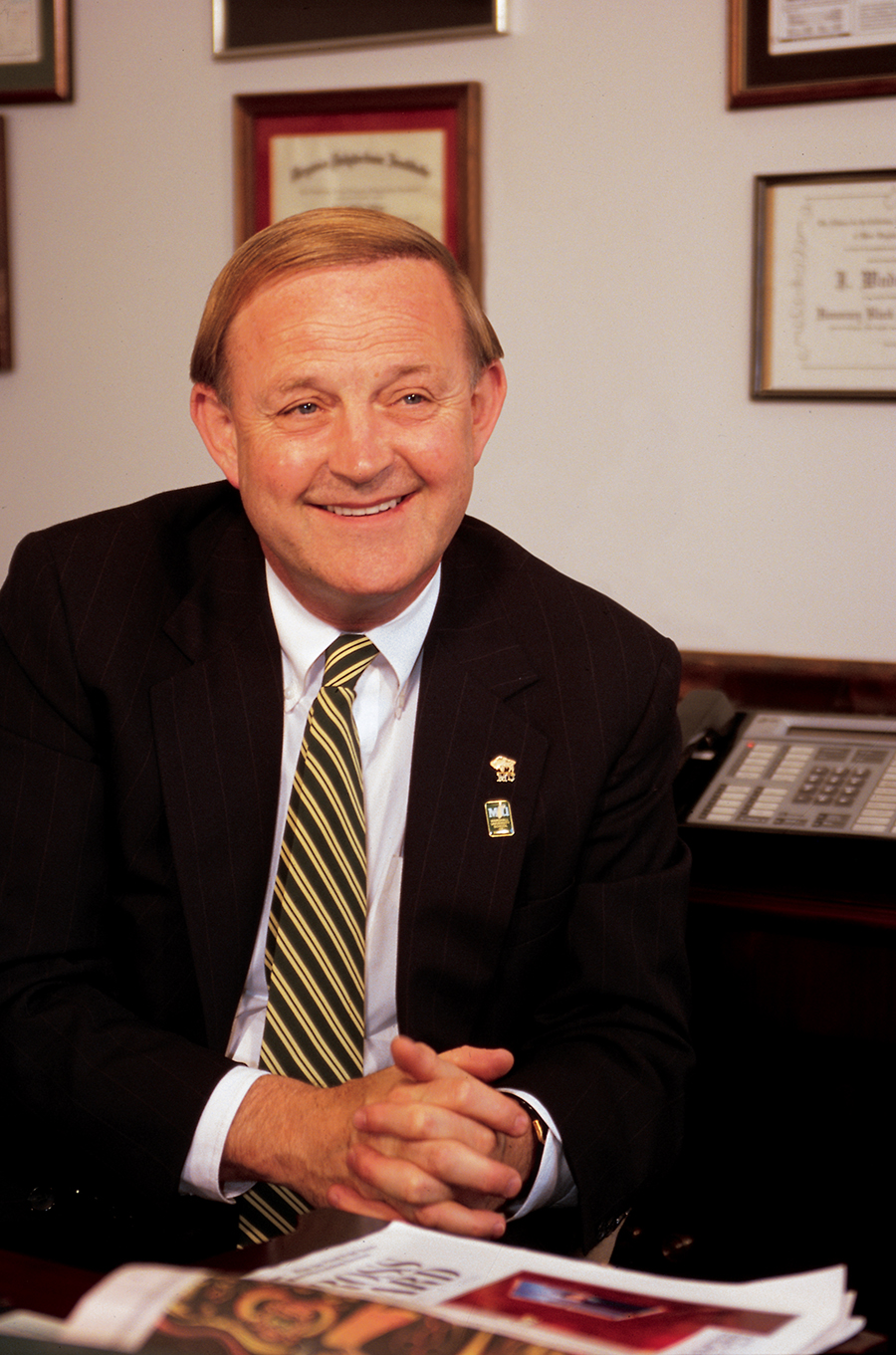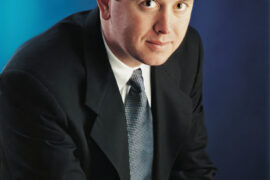Marshall University’s president eyes the future
By Jack Houvouras
HQ 21 | SPRING 1995
James Wade Gilley became the 33rd president of Marshall University on August 1, 1991. Gilley received all of his higher education degrees from Virginia Tech. He earned his bachelor of science degree in civil engineering in 1961; his masters in civil engineering in 1964; and his Ph.D. in civil engineering in 1966. He engaged in postdoctoral studies at the University of Florida in 1972 and earned an advanced certificate in 1975 from the Harvard Graduate School of Business.
He has taught engineering and education at numerous colleges and universities. His honors and recognitions include membership into Sigma Xi; Chi Epsilon; Phi Kappa Phi; Outstanding Research Dissertation, Virginia Tech chapter of Sigma Xi (1966); Outstanding Young Virginian, Richmond Times-Dispatch (1968); and the Kellogg Fellow at the University of Florida (1972).
To date, he has had three books published: Searching for Academic Excellence (Macmillan, 1986, Tamagawa Press, 1991), Thinking About American Higher Education (Macmillan, 1991) and The Interactive University (AASCU, 1991). His books have received such an acclaim that they have been translated to Japanese and Chinese. Gilley has written extensively about the connection between university research and economic development in the United States. He is the co-author of the book, Issues in Higher Education and Economic Development, and has written numerous columns and articles on the subject.
Before assuming the role of president at Marshall University, Gilley had been president of Bluefield State College, Wytheville Community College, J. Sergeant Reynolds Community College, Secretary of Education for the Commonwealth of Virginia and, most recently, Senior Vice President at George Mason University.
Since joining Marshall in 1991, the university has overcome a multimillion deficit with tight management policies. The recovery has been rapid with the Marshall faculty enjoying raises of more than 12 percent over the past two years. During Gilley’s tenure, computers have been made pervasive on campus and more than $75 million in new facilities have been opened.
Huntington Quarterly editor John H. Houvouras sat down with Gilley in March to discuss, among other things, life growing up in rural Virginia, his days playing football for Virginia Tech and his vision for Marshall University in the 21st century.
HQ: Tell us about interviewing for and becoming Marshall’s 33rd president?
GILLEY: The previous year I had interviewed with the Board of Trustees for the position of chancellor of the West Virginia higher education system. At one time, I had served as Secretary of Education for Virginia, a position somewhat equivalent to chancellor of the university system here. So I got to know a lot of people on the Board of Trustees. That position didn’t work out but by the summer of 1990, Dale Nitzschke resigned and a couple of the members of the Board of Trustees called and asked me if I would be interested in Marshall. And I told them I very well might be interested. It stated from there. I was told that I was among the 10 candidates up for the job. I rented a car at Washington Dulles airport and drove to Huntington. I thought it would be good to drive through West Virginia. I stayed an extra day so I could look around and see what Huntington was like. I came for the first interview at the Radisson and was called later and told they had selected five candidates to come to campus. I made a second trip and spent a day and a half on campus and met all the groups. Then, my wife and I were invited back to meet the Board of Trustees. And then, in late May of 1991, I was traveling and had a message at the hotel that night and called home and my daughter told me I had been offered the job as president of Marshall University.
HQ: What did you do your first day on the job?
GILLEY: Well, of course there were several people who wanted to see me – the faculty senate, the staff council. And Herb Karlett, the financial vice president, was very anxious to see me. He informed me that we had a $2.5 million deficit. I also got a parking ticket on my first day. I had driven my wife’s car and parked it out back here. We have a guy who watched the parking lot and he’s very good at giving tickets. There was also a reporter from the Charleston Gazette who I spent a couple of hours with on my first day and he got a picture of me getting the ticket off the car. And that was the lead story in the Gazette the next day. [Laughs].
HQ: What did you and Mrs. Gilley think of your new home at Ritter Park?
GILLEY: We thought it was a beautiful home. It’s also a very functional home for entertaining. And with its location, I say there isn’t a finer president’s home in the country.
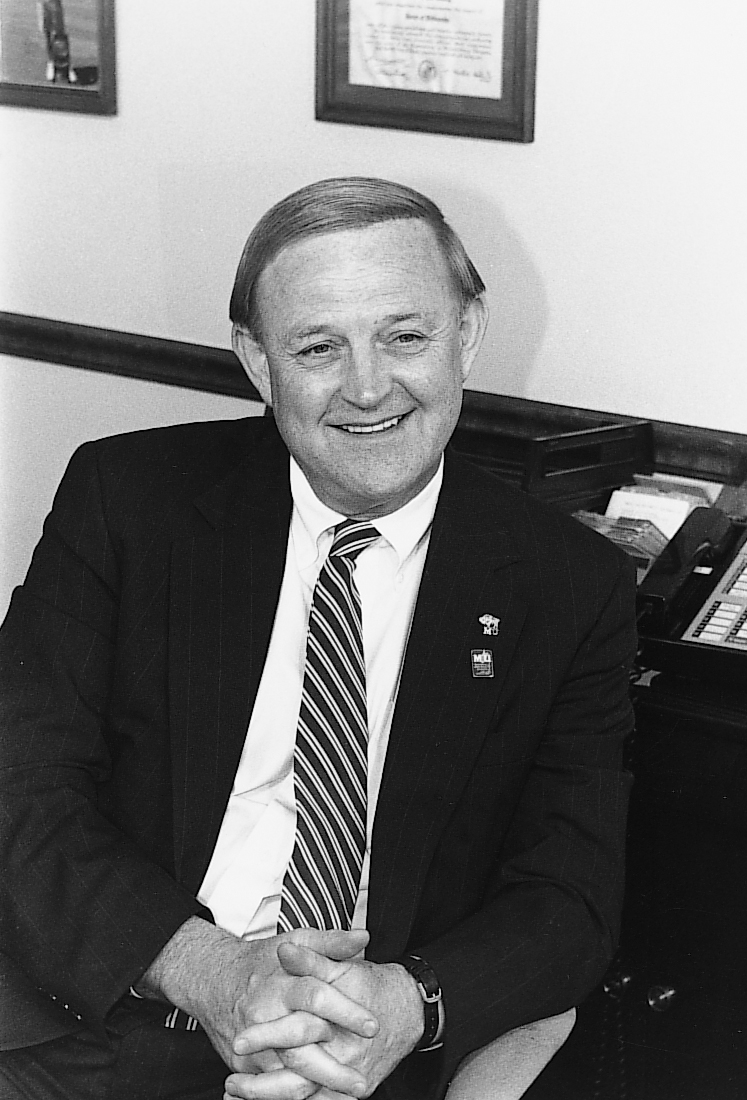
HQ: What were your immediate impressions of Huntington?
GILLEY: When I came for my first interview in late January 1991 my initial impressions were really not that positive. I came down Hal Greer Boulevard and it was cold and dreary. But a number of things have happened since then to improve Hal Greer Boulevard – like taking down the old school building and the new Carter G. Woodson complex. I was impressed with the wide streets and the river town and decided to stay an extra day. I visited the chamber of commerce offices, went around to various businesses and talked to people. I was trying to find out what Huntingtonians thought of Huntington. One of the things I recognized was there was no sense in the community of what a health care center Huntington was. Of all the people I spoke with, none of them mentioned that. When I asked who were the big employers in town, no one mentioned the hospitals or the health care industry. I guess what I saw as an outsider, both initially and it was confirmed later, was more economic potential than people here realized.
HQ: Now that you have lived and worked here for the last four years, what do you see as Huntington’s greatest strengths and weaknesses?
GILLEY: I think Huntington’s greatest strengths are, first, the warm, friendly people. It’s a great place to live, a great place to raise kids, beautiful parks, almost unlimited cultural entertainment and recreational prospects. It’s just a great place to live. Also, I’ll say it again, I see it as a great place for economic potential. And I think that potential is in the new economy – health care, biotechnology, information sciences, environmental sciences. I think the professionals in those industries are looking for good places to live with a high quality of life which is all right here. But also, I think with Marshall University we can develop programs that reinforce those potentials in the community.
HQ: What about any weaknesses?
GILLEY: The major weakness I see is a lack of a unified vision – a common belief in what Huntington can be. And I think that’s a weakness in many cities and localities in America today. It’s a weakness in many universities and it’s prevalent throughout American society today. It’s kind of a self-doubt. But I think we can work together to focus the university and community. We have unlimited potential. I like to say that our only limitations are our imagination and our willingness to work together.
HQ: What are Marshall University’s greatest strengths and weaknesses?
GILLEY: There are a lot of strengths. One is the city/university relationship that is something of an equal partnership. Most universities are in larger cities or small towns and so you don’t have this synergism that exists here that can be built on the achieve our potential. I think the university’s size is a real strength – if we were smaller, we would be limited in a number of ways. If we were larger, we would be so big that it would be difficult to ever get focused. So, I think we’re the right size to do a number of things. One, we can develop a strategic vision that we can all rally around – the faculty, the students, the alumni, the community. I think we are both small enough and large enough to be one of the most technologically sophisticated university across the country.
HQ: Any weaknesses?
GILLEY: The colleges and universities in West Virginia are not as well-funded as they are in the region or even in the Southeast. However, I think we have to look beyond that because our challenge is much like the community’s – our only limitations are our imagination and our willingness to work together for the common good.
HQ: Speaking of funding, anyone who has ever lived in West Virginia is aware of the rivalry that exists between Marshall and WVU. Just how serious is it and does the Marshall community have a gripe regarding a disproportionate allocation of state funds?
GILLEY: Well, I think you could make a case based on the numbers that Marshall should be getting a larger share of state funds. However, I think we really can’t focus on that. Instead, we need to focus on what we can do with the funds we have this year. We have to maximize the impact of our budget. And my contention is that’s the way you secure state resources. You don’t secure it by taking it away from another university. I think the way you get people to invest in you, whether you are talking about the State of West Virginia or private donors or corporations who might want to develop partnerships with the university, is for all of those entities to see the university as a great place to invest. I think that is a much more positive way of dealing with, “How do we get more state resources? How do we get more private resources? Corporate resources?” So, from my own perspective, I’d much rather focus on that – Marshall as a great investment. Show people, “This is what we can do with your money. That is the return on your investment.” And I’m confident if we can do that we’ll fare well in funding from all sources in the future.
HQ: You have written extensively about the connection between university research and ecumenic development in the United States. How do you see the connection between Marshall University and the Huntington community?
GILLEY: I wrote The Interactive University in 1991 and the basic theory of the book is that the university and the community form an equal partnership to identify issues and solutions and then work together. Typically, in an urban university context in the past, what universities did was write research studies – hundreds of thousands of papers written on public education, economic development and assessing this and assessing that. And the university would throw these recommendations out and tell the community that this was what they ought to be doing. But rather than sitting back in the ivory tower and critiquing, the university should become a partner with the community and go beyond recommending solutions. Here at Marshall we are looking at issues like, “Where is the economy going, where is the world going and how can the university develop it’s programs to maximize the potentials of the region?” And so we have focused on health care and biotechnologies. Why? Because health care is still rated as a number one area job creation in the country and it will be for the next five years according to all projections. We have a strong health care industry in the region and strong medical and biomedical programs at the university. Another example of how we are trying to customize our curriculum is our information sciences program. We had two major announcements in Huntington recently that pertain to this field – Somar and Fanueil (both telemarketing firms). So we are trying to develop a university strategy that is conductive to exploiting the potential for economic growth in Huntington and the Tri-State. And I think we’re making some progress. At a recent meeting of HADCO (Huntington Area Development Council), the strategic plan included health care, biotechnologies and information sciences. So their strategic areas of emphasis and the university’s are now beginning to line up. As they do, I think we’ll begin to see a certain synergy develop.
HQ: What exactly is biotechnology?
GILLEY: Biotechnology is everything from implants to DNA typing to the use of biological techniques to improve agriculture. It’s a thousand and one things. One of the promising things to come out of this area of study is our new forensic science masters program and our DNA typing center. The O.J. Simpson case has helped create an awareness of what we are doing in this field. We had a bill go through the legislature and it passed in both the House and Senate due in large measure to the media attention the Simpson case has received. There are now laws in half of the state legislatures that require DNA typing of all felons. The FBI is overwhelmed with requests for training in this field. So they’re very interested in seeing several regional centers around the country to provide this training and testing. We have worked with the FBI in crafting the bill that is in the legislature and we are very hopeful that we will become one of those regional centers that will contract with the FBI. The scope of possibilities with biotechnologies is really unlimited.
HQ: And what about information sciences?
GILLEY: It’s everything from the internet data processing to re-engineering software programs. We just restructured our computer science department to be a software engineering department. We just hired a gentleman who was the head of computer science at the University of New York and we see great potential there working with Corps of Engineers. We just received a $1 million EDA (Economic Development Administration) grant to develop an incubator without walls – tie people together electronically rather than pulling them together in one facility. Information sciences is projected to be the second fastest job growth area in the next five years. It is an example of how the community’s strengths – great quality of life – can be brought together with the university’s strengths to be a part of the economy of the future. And we need to be a part of that. We need jobs for our citizens now but if we’re going to have a growing economy, we need to be on the cutting edge in job creation.
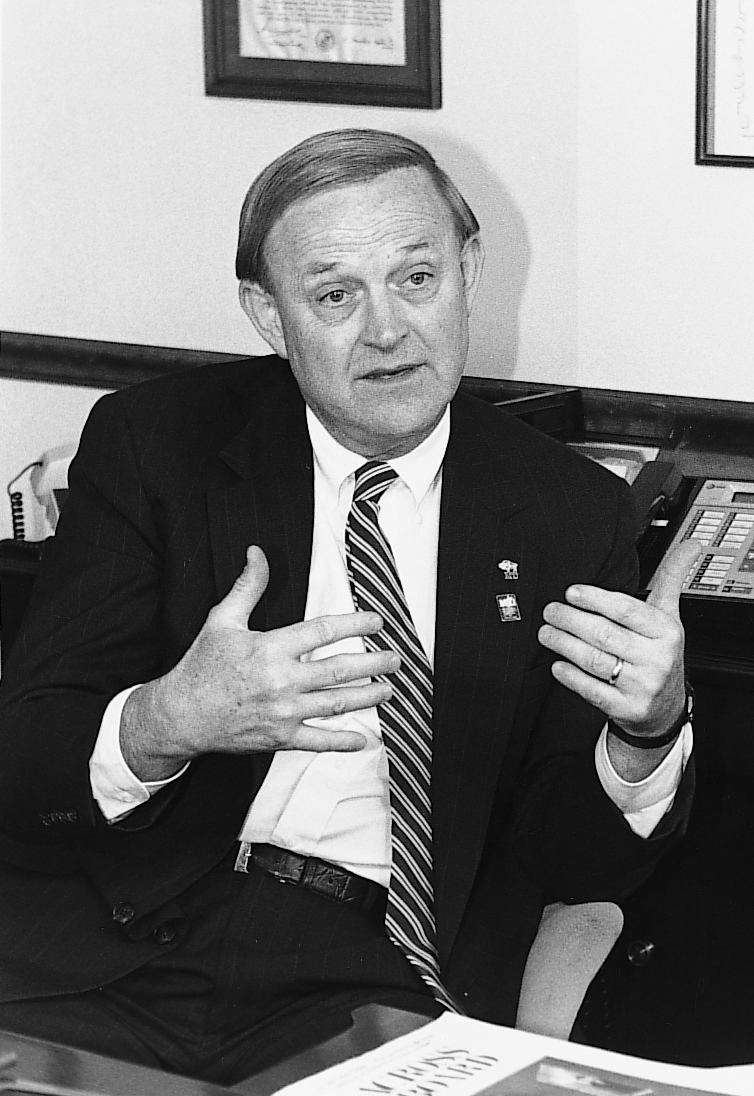
HQ: You are a strong proponent of the computer as a vital part of the learning process. In fact, you have been known to “surf” the internet yourself. What do computers mean to the future of Marshall University and the world?
GILLEY: I think information is going to be extremely accessible in the future. Even today, you can get 1,700 classic works of literature on one CD-Rom disk. Also, on two disks, you can get every telephone directory in the country. Recently, I wanted to get in touch with John Barker who was the president of Marshall from 1971 to 1974. So we put the disk into the computer and typed in “John G. Barker” and we found there were six in the country, one in Wichita Falls, Texas, as we knew the Barker we were looking for was in the Midwest. So I called the number and that’s how I got in touch with him. But also within that one little program was a listing of every business in the country 0 90 million addresses and telephone numbers. You can use that information for random surveys, you can do studies on businesses by getting all the dry cleaners in cities under 50,000 people or whatever. The encyclopedia Britanica can be updated every year on disk and it doesn’t take up a lot of shelf space at the library. You can use the encyclopedia either at the library or from your dorm room or from your home. Anyone with a computer, telephone, modem and library card number would have access to our library. Today, if someone is using a book at the library, everybody else has to wait. But with new technology, numerous people could be using the same book simultaneously. For example, I can get on the internet and look at the card catalog at West Virginia University or at Harvard or at the University of Western Australia.
HQ: What accomplishments are you most proud of thus far in your tenure as president of Marshall University?
GILLEY: A number of interesting things have happened. Obviously we’ve had a lot of recent success with athletics – winning the national championship in football. We’ve had a real resurgence in basketball this year and in all our sports. We have a young, professional coaching staff that are going to provide a very strong athletic program well into the future. I think perhaps the most important thing and the thing I’m most pleased about is the reaction of the faculty senate to curriculum development this pas fall. In six consecutive votes in the faculty senate, we totally restructured the curriculum to create the Marshall Plan for undergraduate education. That’s six faculty senate votes that were all unanimous.
HQ: That has probably never happened before.
GILLEY: I suspect if you asked most of the groups on campus to vote on a pay increase you couldn’t get an unanimous vote. [Laughs] Getting a unanimous vote is unusual. But the program we have created is really unique. For example, people in other colleges and universities are trying to make computer literacy a part of their curriculum, and we’ve already done it here at Marshall. We’re teaching all of our composition courses on computers now so everybody will graduate with at least two semesters of experience in writing papers on the computer. There’s a global studies core for every major from nursing to journalism to science so that all of our students will have a better understanding of the larger world – because we are moving towards an international economy. We have restructured our science and math requirements to ensure our graduates are stronger in those areas. For instance, not only have our graduates had at least two courses in science, but they have been exposed to some of the great ideas in science. They have seen how physics, geology, biology and biotechnology all tie together – the basic laws of science transcend the disciplines in the classroom as they do in nature. We are going to have a senior thesis for all undergraduate students. And we are the only public university fo our size to have any of these requirements. And I think this new program is really going to make the Marshall University degree distinctive in the 21st century. But I’m also pleased that we’re operating under a balanced budget, that our faculty and staff have had 12-15 percent salary increases over the last two years. Of course we’re looking forward to the new library and the new $30 million medical center that we will be building in conjunction with Cabell Huntington Hospital.
HQ: Tell us more about the medical center.
GILLEY: Currently, our medical school is in two parts: one part is the medical education center at the VA Center where the students get their first two years of study; the second part is the clinical setting which takes place at the Doctors’ Memorial Building on Sixth Avenue and in nine or 10 other rented locations throughout the city. A lot of the spaces are old and outdated. But in this new facility we will be bringing most of our faculty and residents together. A Health Sciences Library, an auditorium, and academic and clinical space will also be located in this new facility to be built adjacent to Cabell Huntington Hospital. We will have office space for 180 physicians – 90 will be faculty, 90 will be residents. It will be a state-of-the-art outpatient clinic that is the result of a unique partnership between the hospital and the university medical school. I think it will bring great strength to the medical school. It will assure the long-term existence of the medical school. And as the medical school grows and strengthens, as a health care center. The key to Huntington being competitive with CAMC (Charleston Area Medical Center) in Charleston and other locations is the medical school and its strength. And I would expect that you’re going to see a lot of re-development all across Huntington as health care becomes more prominent here in the next 10 years.
HQ: Perhaps some of the best news to come out of Marshall University in recent years is that a new $22 million state-of-the-art library is on the drawing board. Will it happen and, if so, when?
GILLEY: I am increasingly optimistic. We have $5 million on hand from the federal government. We now have authorization by the legislature to spend up to $15 million in state bonds for the project. We have a commitment of $1 million from an alumnus and have been challenged to match that donation on a three-to-one basis. And then we would like to ultimately raise a total of $7 million in private donations. We have employed architects to move full steam ahead and if everything goes well, we hope to begin advertising for bids about this time next year. It has moved along a lot faster than I thought it would particularly with the help of Sen. Byrd in Washington and House Speaker Chuck Chambers and Sen. Bob Plymale in the legislature.
HQ: What will this new library mean to Marshall students and the Huntington community?
GILLEY: A number of things. One, for the students, it will have adequate space for them to study and do research. Instead of 400-500 student spaces, the new library will have 1,000 student spaces. And these new spaces will not be just study carrels, there will be over 2000 computers for research and information gathering. All of the 1,000 spaces will be wired so a person can take in their own computer. Some of the spaces will be constructed for team projects and study groups. So there will be lots of places for small groups to work together and interact. And we will have between 200,000 and 300,000 volumes of core undergraduate subjects. Through the computers, students will be able to access libraries anywhere in the country if we don’t have the material available. They will have access to hundreds of databases from Nexus to the Library of Congress. Students with computers in the dormitories or at home will be able to interact with the library and tap into a world of information. Further, we have a dream that because of West Virginias fiber optic network through Bell-Atlantic and Huntington’s unique 2,000 mile fiber optic Century Cable system, businesses, hospitals and individuals throughout the Huntington area would have access to this library. You know, the Century Cable plan here would put Huntington in the top two or three percent of cities in terms of our fiber optic technology.
HQ: What was it like growing up in Wytheville, Virginia?
GILLEY: Actually I grew up near Fries, Virginia. It’s pronounced “freeze.” We used to say it “freezes” in the winter and “fries” in the summer. [Laughs] I grew up on the New River just outside of the town of Fries, about 15 miles from Wytheville. It was a unique community. My great-grandfather had about two or three thousand acres of land there in 1860 or 1870. He had 12 children and he sub-divided the land among the 12 children. It was called Hilltown and situated on a ridge that stretched above the the New River. My father had about 15 acres and worked as a builder for the Norfolk and Western Railroad. We were small farmers at the same time. On the other side of the ridge was the town of Fries which was a cotton mill town founded at the turn of the century. Fries was a unique small town in that it had its own hospital, YMCA and sports events. The company that owned the cotton mill provided the YMCA and baseball leagues. So I grew up playing baseball and football and boxing, but I also did a lot of swimming and fishing and exploring along the New River.
HQ: It sounds like a beautiful spot.
GILLEY: We were very poor, but we didn’t know it. [Laughs] Well, we knew it but not in the sense that we were angry about it or that we resented anybody else. Everybody in the community, compared to today’s standards, was very poor. Most families didn’t have a car. Everybody worked. But it was a very secure community. No one locked their doors. There was no crime. It was a church-going community. Everybody was committed to moral and religious values. It was also great in terms of playing sports for a youngster. My parents just kind of turned me loose. It was a great place to grow up. I still tell stories to my children about Fries. It was, in a way, like West Virginia because as you grew up and finished high school, if you wanted to go on to college or find a job you had to leave. There were no industries that you could come back to. So a lot of people left. But among all those who left, there is a feeling that you would like to go back.
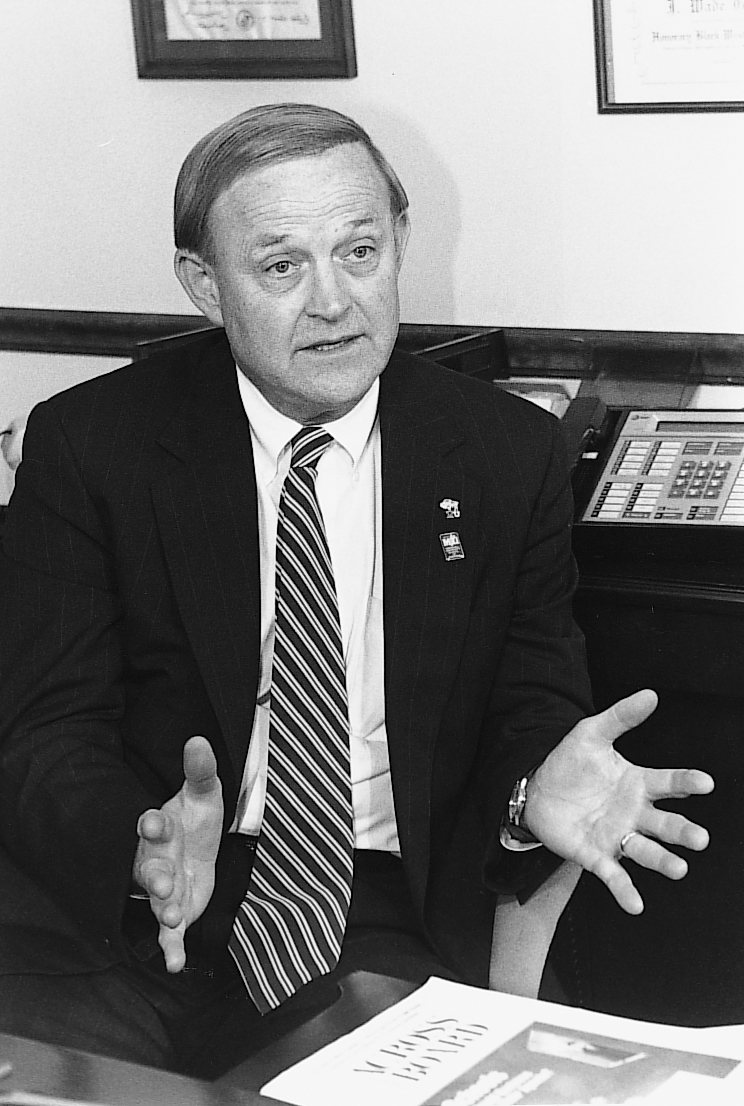
HQ: A lot of Marshall graduates have those same feelings. What can we do in Huntington that would allow them to return to this area?
GILLEY: The university has a significant role to play in that. We can be supportive of everything that HADCO is doing in terms of bringing jobs to the area. But I think more importantly the university can help set the agenda for the future so we can be a part of the new economy – we can have relatively high paying jobs that are outgrowths of a technology-based economy that’s developing worldwide. I think the greatest asset Huntington has, in addition to being a great place to live and raise kids, is a university of this size and complexity. And if we steer the university in the right direction and support it, it can provide real leadership in creating jobs. We need to be figuring out what we, as a city, are going to be in the next five to 10 years rather than solving today’s problems.
HQ: Your father recently passed away. How important were your parents in your life growing up?
GILLEY: They were very important. I went to the funeral last week and spoke about my father. I told several stories about my relationship with my father. The first thing I remember is 1942. At our church we had decoration Sunday where all the members got together outdoors and thew some blankets on the ground and had dinner. It was late May 1942 and I was almost four-years-old and someone asked me, “What do you want to be when you grow up?” And my father said, “He’s going to be a civil engineer.” And 16 years later, when I was a sophomore at Virginia Tech, I woke up one morning and went over to the registrar’s office and changed my major to civil engineering. And I have to think that was the influence of a father. My father was a very intelligent person. He never had the opportunity to graduate from high school because his father died during his junior year. As the oldest of seven children, my father had to go to work. He had this ambition of going to college and becoming a civil engineer but … [Pause] He never discussed it after that. But I had a wonderful relationship with my father. He never criticized me for anything. He would tell people, “he’s never lied to me, I’ve never heard him cuss.” [Laughs] It was those types of expectations that he set. He never asked to look at my report card. He set high expectations and I would scramble to meet them. I have fond memories of him.
HQ: What are some of your memories from your college experience?
GILLEY: I went to Virginia Tech in 1957 thinking I was going to be a football player and get an education. I had a partial scholarship and played on the freshman team. I was on the green squad my sophomore year and played baseball as well. But it was during the middle of my sophomore year that I changed my major to civil engineering and came to the realization that I couldn’t do both carrying 20 hours a semester. And I knew I was never going to make a living playing football. I struggled a lot my first two or three years because I came from a small high school and I really didn’t have much of a science or math background. So I was in the program with a lot of kids from big cities who had been to big high schools. But gradually I began to catch up. I went on the get my masters and my Ph.D. in civil engineering.
HQ: Marshall University athletics has made great strides in recent years. In particular, what do you see in the future for football and basketball programs?
GILLEY: I believe sports and academics work in a certain synergy. If you have a financially-viable athletic program, it can be a great asset to the university because it raises the institution’s image nationally. I want us to continue to improve. We may be facing some serious questions about where we are going to fit into the NCAA – whether we’re going to move up or not. We’re exploring that seriously at this time. I suspect you’ll see us playing at a high level of competition in the future.
HQ: What is your vision for Marshall University in the 21st century?
GILLEY: We have a lot of dreams for Marshall University. But the way I see things is you have to have a simple, straight-forward vision and you need to be able to list it on the fingers of one hand. There are three primary things we are trying to do: First, we want to have a nationally-distinctive 21st century undergraduate education. We will build on our strengths and concentrate more on computer literacy, global studies, senior thesis – really set Marshall apart from other universities of our size. Second, we want to be the most technologically-sophisticated university of our size in the country. We have the building blocks in place from the state’s fiber optic network to the hundreds of computers on campus. The new library will be the keystone. And third, we want to be known as the interactive university. And that means we work hand in glove with the community to provide the context for economic, social and cultural growth in the 21st century. I think Huntington can has this kind of university. It would be nice if we had more state support and we are nearing that end. We have 20 to 25 Marshall University alums in the legislature. And there is private money available from corporations and individuals who can invest in this university and assure the future of Huntington. The university is an institution in America that is going to be at the heart of the new economy of the 21st century. That’s what we have here in Huntington – a university with enormous potential. And if Huntington and the Marshall alumni rally around this university, if we can use our imagination and arrive at a unity of purpose, we can make this institution a leading American university into the 21st century. We can do it and it’s going to do wonders for the economy and growth and the future of this region.

